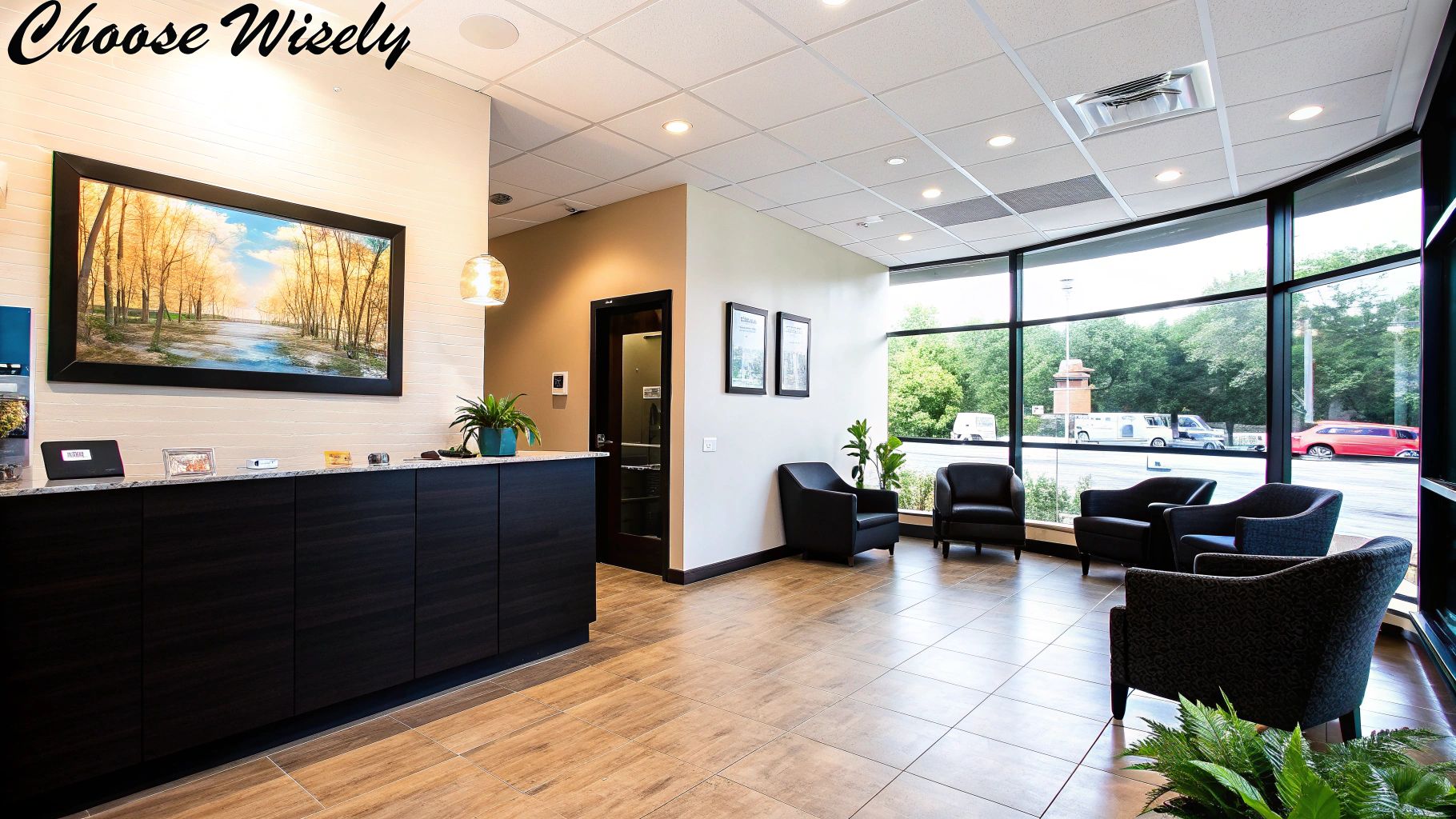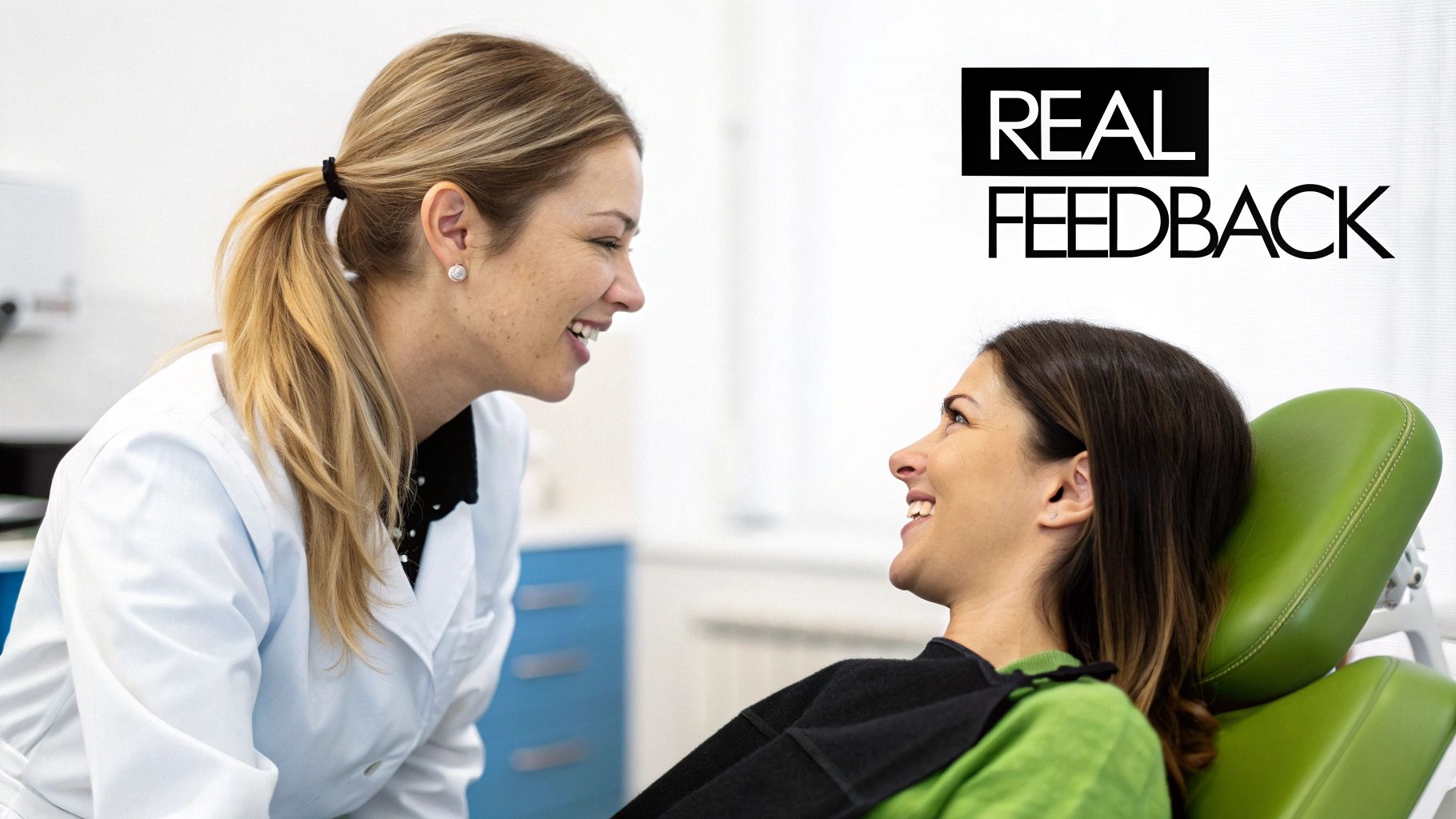Identifying Truly Exceptional Dental Professionals

Choosing the right dentist is a critical decision for your overall health. It's not just about routine cleanings; it's about building a relationship with a healthcare provider who understands your individual needs. This means carefully considering their qualifications and practice. This section will help you identify the qualities of a truly outstanding dental professional.
Beyond the Basics: Credentials That Count
Verifying credentials is a fundamental first step when selecting a dentist. All dentists must graduate from an accredited dental school and pass licensing examinations. Some dentists, however, pursue board certifications in specialized fields such as endodontics or periodontics. Board certification demonstrates advanced expertise and a commitment to best practices. This specialized training becomes especially important if you require specific dental care.
A dentist's ongoing commitment to continuing education is another key indicator of their dedication. Dentistry is constantly evolving, so it's important for dentists to stay informed about the latest advancements in techniques and technology. Seek out dentists who actively engage in professional development. This continual learning leads to improved patient care. For instance, a dentist who regularly attends courses on new implant procedures is better equipped to provide the most effective, current treatment.
Experience and Affiliations: Markers of Quality
While years of experience are valuable, the nature of that experience is equally important. Consider whether a dentist's experience aligns with your specific dental needs. A dentist with significant experience in cosmetic dentistry might not be the ideal choice if you primarily require restorative treatment. Professional affiliations, such as membership with the American Dental Association (ADA), can provide valuable insights. ADA membership signals adherence to ethical guidelines and a commitment to ongoing professional growth, often reflecting a higher standard of care. A 2021 ADEA survey revealed that 50% of aspiring dentists in the United States chose their career path before college. This early commitment often translates into dedicated, lifelong learning and excellent patient care. Find more detailed statistics here.
Assessing Technical Skills and Chairside Manner
Evaluating a dentist’s technical abilities and chairside manner is essential. While online reviews can offer some perspective, consider seeking recommendations from trusted sources like friends, family, or even your physician. These personal referrals often provide valuable nuances about a dentist's skills. Pay attention to the dentist’s communication style during your initial consultation. Do they actively listen and address your questions? A skilled dentist prioritizes patient education, ensuring you feel comfortable and informed throughout your treatment. These interpersonal skills are just as crucial as technical proficiency in fostering a positive dentist-patient relationship. By considering these factors, you can look beyond superficial impressions and choose a dentist who genuinely prioritizes your individual oral health.
Navigating Reputation: Beyond the Five-Star Reviews

Finding the right dentist takes more than just picking the practice with a perfect five-star average. It requires a deeper dive into what truly makes a dental practice reputable. This section explores how to effectively evaluate a dentist's reputation by examining online reviews, tapping into your personal network, and asking insightful questions.
Unmasking Authentic Patient Experiences
Online reviews offer a convenient starting point in your search. However, it’s essential to look beyond the star ratings. A series of generic, positive reviews with suspiciously similar phrasing could be a sign of fabricated testimonials. Focus instead on reviews that offer specific details about the patient experience, highlighting both the positive and negative aspects.
Pay close attention to how the practice handles negative reviews. A thoughtful and professional response signals a commitment to patient satisfaction and a willingness to address concerns. This type of proactive engagement can reveal a lot about the practice's values. On the other hand, defensive or dismissive replies can suggest a lack of accountability.
The Power of Personal Recommendations
While online reviews provide a snapshot of patient perspectives, personal recommendations from your social circle can be incredibly valuable. Talking to friends, family, and colleagues about their dental experiences often reveals nuanced insights that online reviews may miss.
A study in Bucharest underscored the importance of personal connections, revealing that 99.1% of respondents found their dentists through friends or family, compared to only 20.5% who relied on online reviews. Choosing a dentist is a personal decision, and the opinions of those we trust often hold more weight than anonymous online comments. Learn more about how people choose a dentist here.
Meaningful Metrics: Reading Between the Lines
Beyond star ratings and personal anecdotes, consider other factors that reflect a dentist’s standing within the professional community. Look for affiliations with recognized dental organizations like the American Dental Association and evidence of continuing education. These affiliations and ongoing training demonstrate a commitment to staying at the forefront of dental advancements.
Research the dentist’s experience and areas of expertise. While general dentistry encompasses a wide array of services, some dentists focus on specific areas, such as cosmetic dentistry or restorative dentistry. Selecting a dentist whose experience aligns with your specific needs can significantly impact your treatment outcomes. A comprehensive evaluation of a dentist's reputation empowers you to find a dental professional who is not only skilled and experienced, but also dedicated to providing personalized, patient-centered care that prioritizes your individual oral health needs.
Assessing Dental Facilities That Actually Matter

A welcoming waiting area and friendly staff are certainly nice, but truly excellent dental care hinges on the facility itself. This means evaluating more than just the superficial appearance. It's about assessing the practical elements that directly impact your treatment. This section helps you navigate those key aspects.
Technology and Equipment: Signs of True Advancement
Modern technology plays a vital role in accurate diagnoses and effective treatments. When selecting a dental practice, inquire about the specific technologies employed. Digital X-rays, for example, offer significantly reduced radiation exposure compared to traditional film X-rays. Intraoral cameras provide detailed images, allowing you to actively participate in treatment planning.
These advancements aren't merely cosmetic upgrades; they're powerful tools that can dramatically improve the quality of your care. Prioritize practices that invest in patient-focused technologies.
Beyond individual technologies, assess the overall condition of the equipment. Well-maintained equipment demonstrates a commitment to precision and patient well-being. Does everything appear clean and up-to-date? This seemingly small detail can reveal a great deal about the practice’s overall dedication to quality.
Infection Control: Beyond the Minimum Requirements
Stringent infection control is absolutely essential in any dental practice. Don't hesitate to ask about sterilization procedures. Inquire about their adherence to guidelines from organizations like the Centers for Disease Control and Prevention (CDC). A dentist who readily discusses these protocols demonstrates transparency and a commitment to patient safety.
Pay attention to the cleanliness of both treatment rooms and common areas. Are surfaces disinfected between patients? Are instruments properly sterilized and packaged? These observations offer valuable insights into the practice’s commitment to maintaining a safe, sterile environment. This emphasis on hygiene should be a given, not an exception.
To help you in your assessment, the table below outlines crucial aspects of dental facilities:
Essential Dental Practice Features Comparison
This table outlines key features to compare when evaluating different dental practices to help patients make informed decisions.
| Feature | What to Look For | Why It Matters | Red Flags |
|---|---|---|---|
| Technology & Equipment | Digital X-rays, intraoral cameras, modern equipment | Improved accuracy, patient comfort, better treatment outcomes | Outdated equipment, lack of advanced technology |
| Infection Control | Adherence to CDC guidelines, visible disinfection practices, proper sterilization | Minimizes risk of infection, ensures patient safety | Lack of visible cleaning, unwillingness to discuss protocols |
| Emergency Capabilities | Availability of emergency appointments, clear after-hours protocols | Provides peace of mind, ensures prompt care in urgent situations | No emergency contact information, unclear procedures |
| Service Offerings | Alignment with individual needs (e.g., cosmetic, family) | Ensures you receive the most appropriate treatment | Limited services, lack of specialization |
This comparison table highlights the essential features to consider when evaluating dental facilities. By using this as a guide, you can make more informed decisions about your dental care.
Emergency Capabilities and Service Offerings: Alignment With Your Needs
Dental emergencies, while hopefully rare, can occur. Choose a dentist equipped to handle these situations. Do they offer emergency appointments? What's their protocol for after-hours care? Knowing these details can provide valuable peace of mind.
Finally, consider whether the practice’s range of services meets your specific dental needs. Some practices specialize in particular areas, like cosmetic dentistry or implants. Others provide comprehensive family care. Choosing a dentist whose expertise aligns with your requirements ensures you receive the most effective treatment. Think about your long-term oral health goals and select a practice that can support you on your dental journey. This proactive approach can save you time and expense in the future.
Decoding Dental Costs and Insurance Realities

Understanding dental costs and how your insurance works is crucial for making informed decisions about your oral health. This section explores the financial aspects of dental care, helping you navigate insurance networks and out-of-pocket expenses. This knowledge empowers you to choose a dentist offering excellent care and transparent pricing.
Navigating Insurance Networks and Out-of-Pocket Costs
Most dental insurance plans work within a network of providers. Choosing an in-network dentist often results in lower out-of-pocket costs. However, cost shouldn't be the only factor. A lower price doesn't guarantee quality care.
Out-of-pocket expenses vary based on the treatment and your insurance plan. Before any procedure, request a detailed cost breakdown to avoid surprises.
Don't hesitate to discuss payment options and financing plans with your dentist, especially for extensive treatments.
Identifying Fair Pricing and Avoiding Price Gouging
How can you tell if pricing is fair? Research typical costs for common procedures in your area. Resources like the Fair Health Consumer website offer helpful benchmarks. Keep in mind that prices can vary based on location and the dentist's expertise.
Prioritize transparency in pricing. A reputable practice clearly outlines fees and explains any variations. They should openly discuss payment options and work with you on a manageable financial plan. This open communication builds trust.
The Value of Premium Care and Negotiation Strategies
Sometimes, premium care offers long-term value, especially for complex procedures like implants or cosmetic treatments. The higher initial cost can lead to savings down the road due to superior quality and longevity. Think of it like investing in a well-made car: higher upfront cost, but fewer repairs later.
Don't be afraid to negotiate. Many practices are willing to discuss fees, particularly if you have financial constraints. Present your budget clearly and respectfully. Explore compromises, like a phased treatment plan that spreads the cost over time.
Understanding patient preferences is essential, and even small amounts of data can provide valuable insights. Learn more about the value of small data samples here. This knowledge helps both you and your dentist make informed decisions.
To help you compare costs and understand pricing factors, consider the following framework:
Dental Cost Comparison Framework
| Service Type | Average Cost Range | Insurance Coverage Typical % | Questions to Ask |
|---|---|---|---|
| Routine Checkup & Cleaning | $75 – $200 | 80% – 100% | Is fluoride treatment included? Are X-rays additional? |
| Filling (composite) | $150 – $300 | 50% – 80% | How many surfaces are being filled? What type of material is used? |
| Crown (porcelain) | $800 – $1,500 | 50% – 70% | Is a temporary crown included? What is the warranty period? |
| Root Canal | $700 – $1,200 | 50% – 80% | Are X-rays and follow-up visits included? |
| Extraction (simple) | $75 – $200 | 50% – 80% | Are pain medications included? What are the post-extraction care instructions? |
This table provides a basic framework. Actual costs and coverage will vary based on your specific plan and location. Use this table as a starting point for your research and discussions with dental professionals.
Ultimately, choosing a dentist involves balancing quality of care, cost, and open communication.
Evaluating Chair-Side Communication That Builds Trust
Finding the right dentist goes beyond checking online reviews and verifying credentials. A healthy dentist-patient relationship hinges on clear, empathetic communication. This section explores how to assess those communication qualities that build trust and make for a positive dental experience. This is especially important when selecting a dentist, because a strong, trusting relationship contributes to better oral health in the long run.
Recognizing Genuine Listening vs. Performative Attention
During your first consultation, pay attention to how the dentist interacts with you. Do they really listen to your concerns and answer your questions completely? Or do they seem rushed and dismissive? True listening is about more than just hearing words; it's about understanding your needs and anxieties. A dentist who actively listens makes eye contact, asks clarifying questions, and summarizes your concerns to confirm they understand your perspective.
For example, a dentist who is truly engaged might say, "So, if I'm hearing you correctly, your biggest concern is the potential discomfort during the procedure?" This validation of your feelings establishes trust. It demonstrates that they are interested in your well-being as a whole, not just the technical aspects of the treatment.
The Importance of Informed Consent and Decision-Making Autonomy
A patient-focused dentist prioritizes informed consent. This involves clearly explaining all treatment options, outlining the benefits and risks of each. They empower you to make educated decisions about your oral health, respecting your autonomy. They won't pressure you into specific treatments but instead present information objectively, enabling you to choose what's best for you.
A dentist who truly values informed consent encourages questions and dedicates time to addressing any doubts you might have. They know that making well-informed choices requires clear communication and a two-way conversation. This teamwork approach creates a feeling of partnership between you and the dentist.
Cultural Sensitivity and Addressing Dental Anxiety
Cultural sensitivity is another critical element of effective chair-side manner. A good dentist understands that cultural backgrounds can affect healthcare preferences and communication styles. They tailor their approach accordingly, making sure patients from all backgrounds feel at ease and understood. This inclusive approach cultivates a welcoming atmosphere where everyone feels respected.
Many people experience dental anxiety. A compassionate dentist acknowledges these fears and offers ways to cope with them. They might suggest options such as sedation dentistry or simply spend extra time explaining the procedure and answering questions. Dismissing a patient's concerns is a sign of poor communication. An empathetic dentist listens with understanding and offers practical solutions.
Practical Strategies for Assessing Communication Style
Evaluating a dentist's communication style requires active participation from you. Prepare a list of questions before your appointment to ensure you cover all your important concerns. Pay attention to their body language, tone of voice, and overall demeanor. Do you feel comfortable asking questions? Do you feel heard and understood?
Consider these helpful tips:
- Prepare a list of questions: This helps you address key concerns and evaluate their responses.
- Observe body language: Nonverbal cues can tell you much about their attentiveness and empathy.
- Assess their tone of voice: A calm, reassuring tone builds trust, while a dismissive tone is a red flag.
- Reflect on your comfort level: Trust your gut feeling. Do you feel at ease asking questions and sharing your concerns?
Choosing a dentist who communicates well is a key step in building a positive, long-term dental relationship. This open communication ensures you'll receive effective treatment and have a positive, empowering experience.
Practical Factors That Make or Break Dental Relationships
A skilled dentist is essential, but practical factors can significantly impact your long-term dental care. This section explores the logistical elements that elevate good dental care into a sustainable, positive relationship. Choosing a dentist involves more than finding someone qualified; it's about building a connection you can maintain for years to come.
Office Policies: A Window Into Practice Values
A dental practice’s policies often reveal its core values. Consider appointment flexibility. Does the practice offer evening or weekend hours to accommodate busy schedules? This can be crucial for working professionals or families with packed calendars. A practice operating only during traditional business hours might not be suitable for everyone.
Emergency protocol is equally important. How does the office handle urgent dental needs? A clear and accessible emergency contact system demonstrates a commitment to patient well-being. This can offer peace of mind, especially for those who’ve experienced dental emergencies before. Finally, take a look at the practice’s cancellation policy. Understanding the terms upfront can prevent frustration and unexpected fees.
Location and Accessibility: Beyond Simple Proximity
While convenience is key, consider accessibility beyond simple proximity. Is the office easily accessible by public transportation? Is there ample parking? These factors are particularly important for those with mobility challenges or who rely on public transit.
The office environment itself matters, too. Is the space designed with patient comfort in mind? A clean, welcoming, and accessible facility contributes to a positive experience, easing any anxiety often associated with dental visits. These practical elements significantly affect your comfort level and the longevity of your dental relationship.
Digital Communication: Modernizing the Patient Experience
In a connected world, digital communication tools enhance the patient experience. Does the practice offer online appointment scheduling or secure messaging for non-urgent inquiries? These features streamline communication and save you time.
Consider also how the practice uses technology for patient education. Do they share informative resources about oral health online? This demonstrates a commitment to patient empowerment and knowledge. Online resources can help you understand treatments, make informed decisions, and improve your oral hygiene habits.
Building a lasting relationship with your dentist involves thoughtful consideration of practical factors. By evaluating office policies, accessibility, and communication methods, you can choose a dentist who provides excellent care and cultivates a positive, convenient experience.
Looking for exceptional dental care in Mission Viejo? Saddleback Dental Associates provides comprehensive services emphasizing patient comfort and convenience. Schedule your appointment today and experience the difference personalized care and advanced technology can make. Visit Saddleback Dental Associates.
Article created using Outrank

